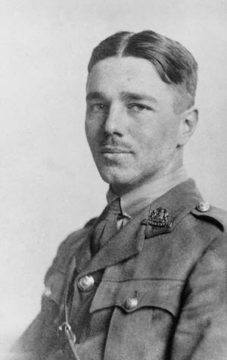by Thomas Larson

Among the youngest and most soul-haunted poets who endured trench warfare during the First World War was Wilfred Owen—a British lieutenant, who died in France in 1918, one week before the Armistice. He was twenty-five. Owen was raised by an evangelical Anglican mother with whom he was abnormally close. She placed her provincial son into the service of a vicar—visiting the poor and sick, which Owen loathed—until he escaped and went to France in 1913. There, his faith began to unravel, declaring to her that “I have murdered my false creed.” War afoot, he returned to England and enlisted in the Artists’ Rifles, a British military order, rising quickly to officer. His fighting ability was tragically competent.
In April 1917, assigned a squad at the front, a shell exploded two yards from his head and he was severely concussed. Sent home, confused and shaky, he recuperated by writing. As his biographers note, the war was good for his poetry. His front-forged verse found its edge. He wrote brutal elegies for the lads he commanded and saw shot and with whom, as spirits, he communed. Dozens of men dead, their “unburiable bodies” lay as “expressionless lumps.” Freed from the horrors of gas and bombardment, “their spirit drags no pack, / Their old wounds, save with cold, cannot more ache.”
Such men were, in part, entranced by a three-hundred-year tradition of English Poetry, from Spenser to Sassoon, in which British boys were enchanted by the Romantic concept of the soul—whose life and death was given to love, honor, faith, courage, even the finicky rewards of verse. Read more »
